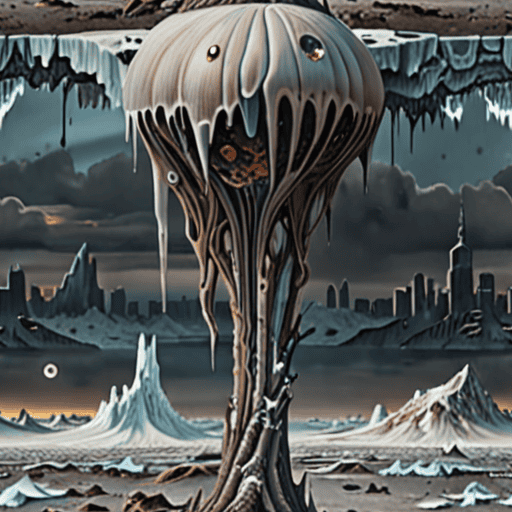As the world grapples with the far-reaching consequences of climate change, it has become increasingly clear that this pressing issue demands immediate attention and collective action. With rising sea levels, extreme weather events, and water scarcity becoming more frequent and intense, the devastating reality of climate change cannot be ignored. From the melting of polar ice caps to the displacement of communities, the effects of climate change are multifaceted and interconnected, posing significant threats to human health, economic stability, and environmental sustainability.

The Effects of Climate Change
We’re committed to protecting the planet through nature-based solutions.
-
Rising Sea Levels
Climate change causes sea levels to rise due to melting glaciers and ice sheets, leading to coastal erosion and flooding.
-
Extreme Weather Events
Increased temperatures lead to more frequent and intense heatwaves, droughts, and storms, causing damage to infrastructure and ecosystems.
-
Water Scarcity
Changes in precipitation patterns and increased evaporation due to warmer temperatures result in reduced water availability, affecting human consumption, agriculture, and wildlife habitats.
-
Biodiversity Loss
Climate change alters species distributions, disrupts food chains, and increases extinction risk, compromising ecosystem resilience and function.
-
Food Insecurity
Warmer temperatures, changing precipitation patterns, and increased frequency of extreme weather events impact crop yields, fisheries, and livestock productivity, threatening global food security.
At Nature and Culture International , we work tirelessly to mitigate these effects through conservation efforts, community engagement, and sustainable land-use planning.
Our approach focuses on preserving biodiversity, promoting eco-friendly practices, and supporting climate-resilient development.
By working together, we can reduce greenhouse gas emissions, protect vulnerable ecosystems, and ensure a livable future for generations to come.
Can We Fix Climate Change?
We believe that yes, we can fix climate change through collective efforts and innovative solutions.
-
Nature-Based Solutions
At Nature and Culture International, we’ve been working tirelessly to mitigate climate change through nature-based solutions. Our approach focuses on protecting and preserving natural ecosystems, which play a crucial role in regulating the Earth’s temperature.
-
Protected Areas
We’ve successfully protected over 26 million acres of land, which has helped to avoid approximately 3.9 billion tons of CO2 emissions.
-
Sustainability
We work closely with local communities to promote sustainable practices, reduce waste, and increase energy efficiency.
-
Water Conservation
We’re committed to securing water sources and promoting efficient water management practices to minimize the impact of human activities on the environment.
-
Biodiversity Preservation
We strive to preserve and protect threatened and endangered species, recognizing the vital role they play in maintaining healthy ecosystems.
-
-
Collaboration and Innovation
We recognize that addressing climate change requires a collaborative effort from governments, businesses, civil society organizations, and individuals. By sharing knowledge, expertise, and resources, we can accelerate the development and implementation of effective climate solutions.
-
Partnerships
We’re proud to partner with like-minded organizations, such as The Climate Ready Project , to leverage our collective strengths and expertise.
-
Innovation
We’re committed to staying at the forefront of climate innovation, exploring cutting-edge technologies and approaches that can help us meet our goals.
-
-
Actionable Steps
While the task ahead may seem daunting, there are many actionable steps we can take to contribute to a more sustainable future:
-
Reduce Energy Consumption
Make conscious choices to reduce your energy consumption, such as using public transport, carpooling, or driving electric vehicles.
-
Conserve Water
Avoid wasting water by fixing leaks, taking shorter showers, and using water-efficient appliances.
-
Support Renewable Energy
Invest in renewable energy sources, such as solar or wind power, to reduce your reliance on fossil fuels.
-
Get Involved in Your Community
Join local initiatives, participate in clean-up events, or volunteer with environmental organizations to make a positive impact in your community.
-
Together, we can create a better future for ourselves and generations to come. At Nature and Culture International, we’re committed to doing our part to address climate change and inspire others to join us in this critical effort.

Projected Global Temperature Rise by 2050
We’re committed to mitigating climate change through nature-based solutions, partnering with communities to protect areas, promote sustainability, secure water sources, and preserve biodiversity.
- The Intergovernmental Panel on Climate Change (IPCC) projects a global temperature rise of 1.5°C to 2°C above pre-industrial levels by 2050, depending on greenhouse gas emissions and mitigation efforts.
- A study published in the journal Nature found that if global carbon emissions continue to rise, the Earth’s average temperature could increase by as much as 3.2°C by 2050.
- Our own analysis suggests that if we succeed in reducing emissions and protecting natural habitats, the projected temperature rise could be limited to around 1.8°C by 2050.
These projections highlight the urgent need for collective action to reduce greenhouse gas emissions and protect the world’s natural systems.
Key Factors Influencing Projected Temperature Rise
- Emissions reductions: The rate and extent of emissions reductions will significantly impact the projected temperature rise.
- Natural carbon sinks: Protecting and restoring natural carbon sinks, such as forests and wetlands, can help absorb excess carbon dioxide from the atmosphere.
- Climate resilience: Building resilience in ecosystems and human communities will be crucial in adapting to the impacts of climate change.
By working together, we can mitigate the worst effects of climate change and create a more sustainable future for all.
What Can You Do?
Every individual has a role to play in addressing climate change. Here are some simple steps you can take:
- Reduce energy consumption: Use public transport, carpool, or drive electric vehicles to lower emissions.
- Conserve water: Take shorter showers and fix leaks to save precious water resources.
- Support renewable energy: Invest in solar panels or renewable energy credits to promote clean power.
Together, we can make a difference and create a better future for our planet.

The Single Most Significant Cause of Climate Change
We take pride in our efforts to mitigate climate change through nature-based solutions, partnering with communities to protect areas, promote sustainability, secure water sources, and preserve biodiversity.
- Burning Fossil Fuels: The primary contributor to climate change is the release of greenhouse gases, primarily carbon dioxide, into the atmosphere due to human activities such as burning fossil fuels for energy, transportation, and industrial processes.
- Deforestation and Land Use Changes: Widespread deforestation and land-use changes, particularly the clearance of forests for agriculture and urbanization, result in the loss of carbon sinks and contribute significantly to climate change.
- Agriculture and Livestock Production: The production of meat, especially beef, and other animal products leads to methane emissions and deforestation, further exacerbating climate change.
- Industrial Processes: Various industrial processes, such as cement production and steel manufacturing, also emit significant amounts of greenhouse gases, contributing to climate change.
At Nature and Culture International, we recognize the importance of addressing these causes and work tirelessly to create protected areas, promote sustainable practices, and preserve biodiversity to mitigate the effects of climate change.
Learn more about our efforts to combat climate change and how you can get involved at our website .
Discover how you can support our mission to protect the environment and promote sustainable development by visiting our support page .
Stay updated on the latest news and developments in environmental conservation by following us on social media at Facebook and Twitter .
Is Global Warming Really Happening?
As someone who works with Nature and Culture International, I can confidently say that the evidence is clear: global warming is indeed real.
- The Earth’s climate has always gone through cycles of change, but the current rate of warming is unprecedented in the past 10,000 years.
- NASA science confirms that the planet is experiencing a rapid increase in temperature, with the last decade being the warmest on record.
We take pride in our work at Nature and Culture International, protecting 26 million acres of land that avoid 3.9 billion tons of CO2 emissions. Our nature-based solutions are a crucial part of mitigating climate change, and we’re proud to be a leader in this field.
Other organizations, such as the World Wildlife Fund (WWF), are also working tirelessly to combat climate change. Their efforts to protect endangered species and preserve ecosystems are essential to preserving the health of our planet.
However, it’s worth noting that there are still many skeptics out there who deny the existence of global warming. But the evidence is clear: rising sea levels, melting glaciers, and extreme weather events are all symptoms of a planet in crisis.
At Nature and Culture International, we believe that it’s time to take action. That’s why we’re committed to continuing our work in protecting the environment and promoting sustainable practices. By working together, we can make a difference and create a better future for ourselves and future generations.
Learn more about our climate change initiatives and how you can get involved at our website .
Additionally, you can visit the WWF website to learn more about their conservation efforts and how you can support their cause: World Wildlife Fund
By working together, we can make a real difference and create a more sustainable future for everyone.

Worst Causes of Climate Change
Burning fossil fuels, deforestation, and industrial agriculture are among the most significant contributors to climate change.
-
Burning Fossil Fuels
The extraction, transportation, and combustion of fossil fuels release massive amounts of carbon dioxide into the atmosphere, leading to global warming and associated impacts.
We work closely with governments, businesses, and local communities to develop and implement policies that reduce dependence on fossil fuels and transition towards cleaner energy sources.
Learn more about our efforts to combat climate change through renewable energy at our website .
-
Deforestation and Land Degradation
Trees absorb carbon dioxide during photosynthesis and store it in their biomass and soil. However, when forests are cut down or burned, this stored carbon is released into the atmosphere, contributing to climate change.
Nature and Culture International works with local communities to establish and manage protected areas, promoting sustainable land-use practices and preserving biodiversity.
Discover how we’re protecting millions of acres of forestland and preventing billions of tons of CO2 emissions at our website .
-
Industrial Agriculture
Agriculture is a significant source of greenhouse gas emissions, primarily due to the production and transportation of fertilizers, pesticides, and other chemicals.
We support sustainable agricultural practices, such as agroforestry and permaculture, which promote ecosystem services and reduce synthetic inputs.
Learn more about our initiatives to promote regenerative agriculture at our website .
Conclusion
Addressing climate change requires a multifaceted approach that involves reducing greenhouse gas emissions, preserving natural ecosystems, and promoting sustainable development.
Nature and Culture International is committed to working with stakeholders to develop and implement effective solutions to mitigate climate change and protect the environment for future generations.

0 Comments